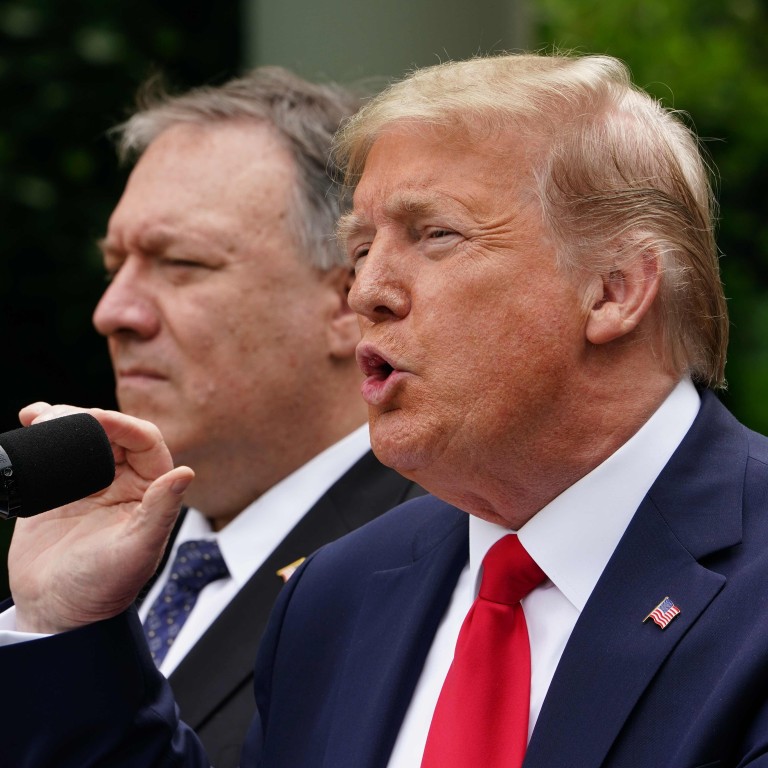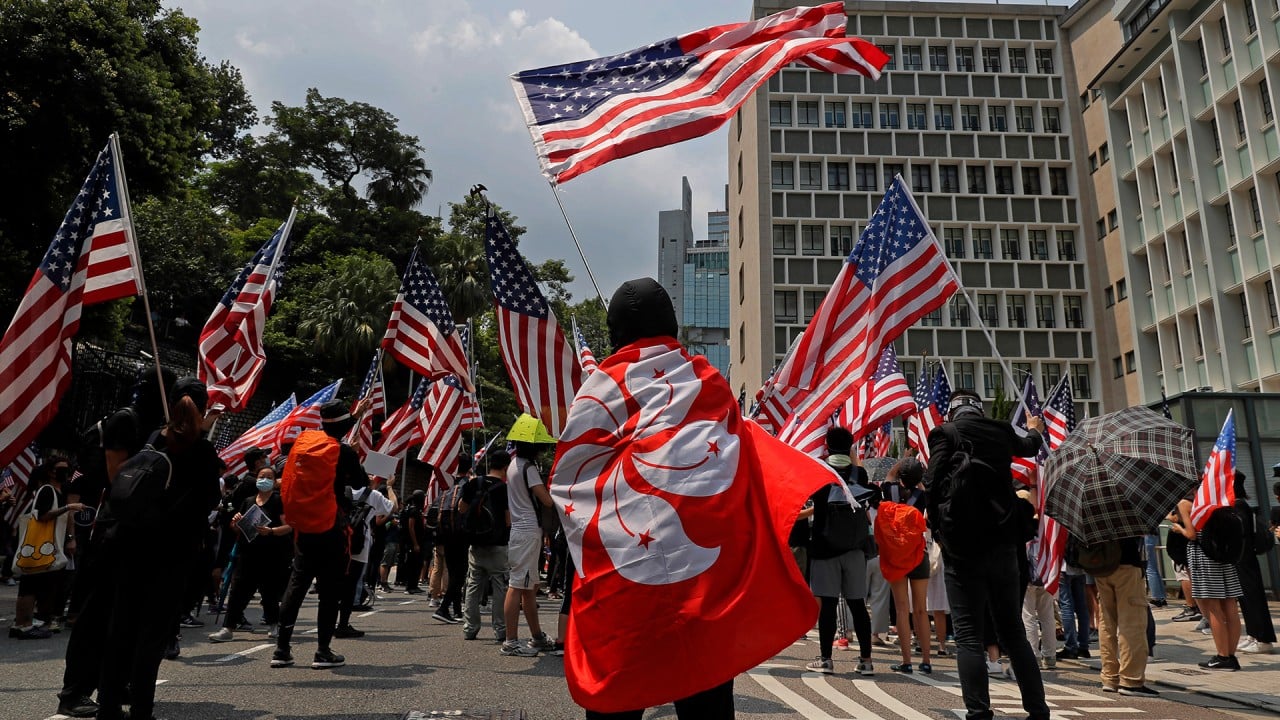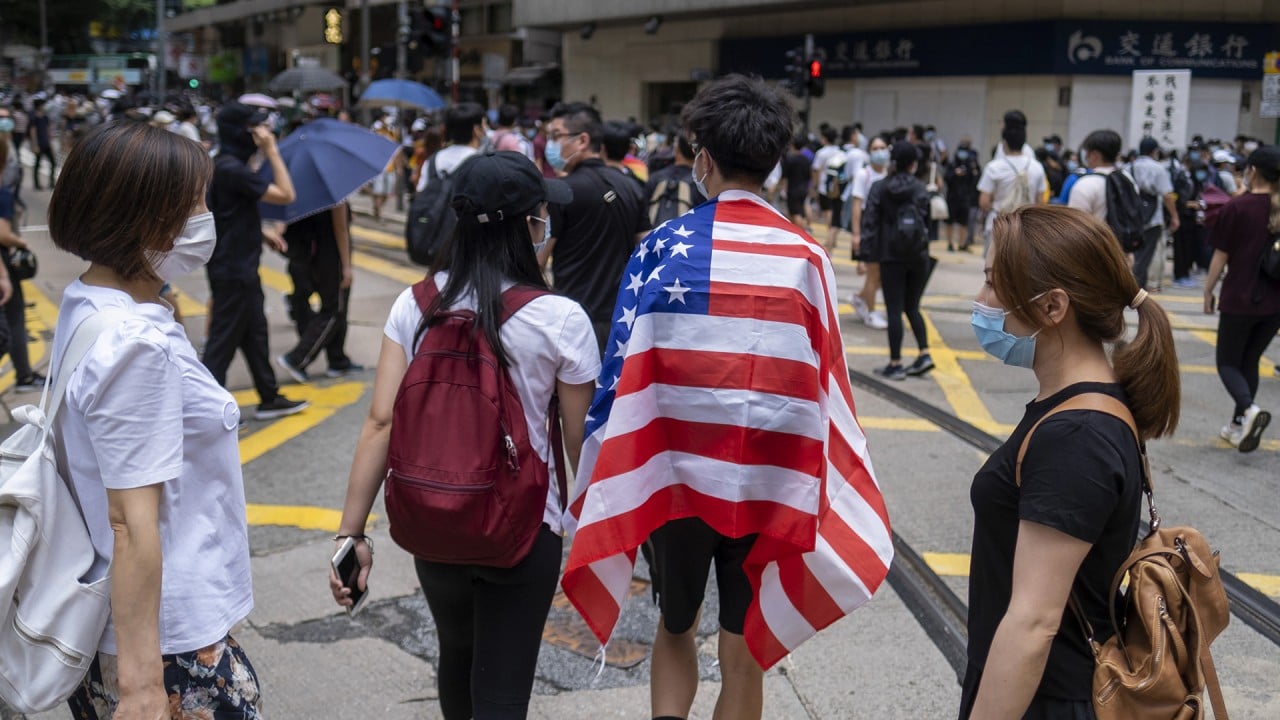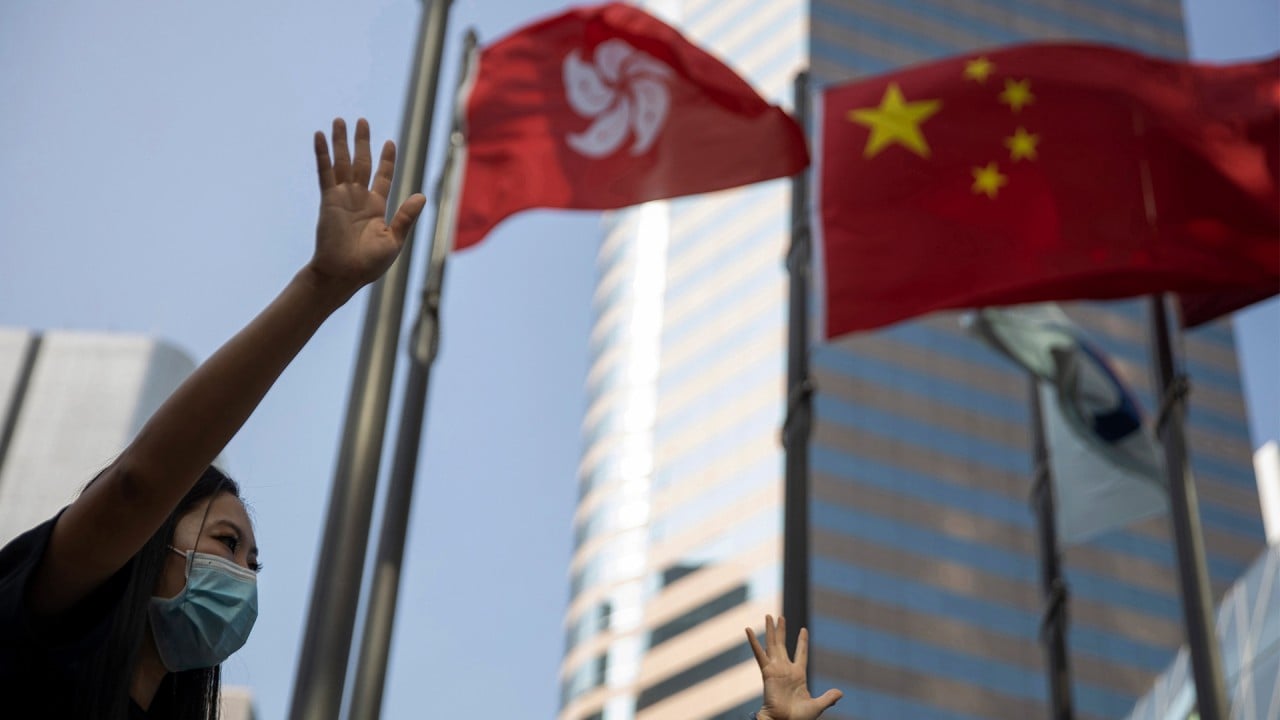
Donald Trump says US to end Hong Kong trade privileges as ‘it is no longer autonomous from China’ after new security law introduced by Beijing
- ‘We will take action to revoke Hong Kong's preferential treatment as a separate customs and travel territory from the rest of China,’ the US president says
- Statement comes after US Secretary of State Mike Pompeo hinted at imminent punitive measures against Beijing
The US government will begin eliminating special policy exemptions it grants Hong Kong, following its determination earlier this week that the city is “no longer autonomous” from mainland China, President Donald Trump announced on Friday.
The move will affect “the full range of agreements” the US has with Hong Kong “with few exceptions”, Trump said in the Rose Garden at the White House, including its extradition treaty with the city and economic privileges enshrined in US law that differentiate it from mainland China.
“We will take action to revoke Hong Kong’s preferential treatment as a separate customs and travel territory from the rest of China,” said Trump, indicating that the State Department’s travel advisory for the city would be updated “to reflect the increased danger of surveillance and punishment by the Chinese state security apparatus”.
The US would also take steps to sanction Chinese and Hong Kong officials “directly or indirectly involved in eroding Hong Kong’s autonomy”, he said, echoing the language of legislation enacted in November that requires a punitive response from the executive branch in such circumstances.

00:50
Donald Trump announces US will revoke Hong Kong’s special status
The announcement came a week after Beijing declared it planned to institute a new security law tailor-made for Hong Kong that would prohibit acts of subversion, sedition and secession – a move that critics fear will effectively criminalise all forms of dissent and opposition activity.
The new legislative action, which the National People’s Congress officially approved on Thursday, would extend the reach of China’s “invasive state security apparatus into what was formerly a bastion of liberty”, Trump said, accusing Beijing of replacing its “promised formula of ‘one country, two systems’ with ‘one country, one system’”.
“This is a tragedy for the people of Hong Kong, the people of China, and indeed the people of the world,” he said.
Announcing the bombshell move during a short, scripted briefing at which he did not take any questions, Trump did not give any indication as to how quickly his administration would enact the new measures.
Having tweeted “CHINA!” earlier in the morning, Trump announced the move alongside other measures targeting Beijing, including a declaration that the US would withdraw from the World Health Organisation (WHO) over accusations of a China-centric bias.
It is not clear how Trump will achieve that, since much of the financing or WHO is appropriated by Congress and the president ordinarily lacks the authority to redirect congressionally mandated funding.
Trump also hinted at action against Chinese companies listed on US equities markets, announcing that he was instructing the presidential working group on financial markets to “study the differing practices of Chinese companies listed on the US financial markets, with the goal of protecting American investors”.
And soon after Trump’s announcement, the White House issued a proclamation barring Chinese researchers with current or past ties to entities that implement or support Beijing’s “military-civil fusion strategy” from entering the US to conduct research. The new rules, effective June 1, will not apply to undergraduate students.

02:18
White House says Beijing’s proposed national security law for Hong Kong could lead to US sanctions
But Trump did not include the phase-one trade deal that Washington and Beijing signed in January. US stock indexes, which had been slipping on Friday ahead of the announcement, closed mixed; the Dow Jones Industrial Average was down less than one-tenth of a per cent, while the Standard and Poor’s 500 index rose roughly half a per cent.
US Secretary of State Mike Pompeo had hinted at imminent punitive measures against Beijing on Thursday, telling Fox that Trump would make announcements addressing “the threat to the United States of America, the American people’s security, as it emanates from this tyrannical regime inside of China”.
But Friday’s announcement on Hong Kong-related measures had left “many open questions”, said Wendy Cutler, a former US trade negotiator.
Noting that Trump had not elaborated on the timing and scope of steps to revoke Hong Kong’s special status, Cutler said: “Export controls, tariff treatment, visas and other measures are all on the table, but the potential impact on China, Hong Kong, and US businesses is unclear without more details.”
By saying there would be “few exceptions”, Trump had also given himself some “wiggle room”, Jude Blanchette, a China expert at the Centre for Strategic and International Studies, said.
“This is what we should have expected, which is a very ‘strong’ statement that is a ‘response’, but yet hasn't exactly done anything,” Blanchette said at a webcast event hosted by the National Committee on US-China Relations.

On Capitol Hill, Trump’s multipronged onslaught against Beijing was applauded and derided across largely partisan lines.
Senate minority leader Charles Schumer, Democrat of New York, called Trump’s Rose Garden event “pathetic”, and said it “perfectly encapsulates his inability to lead when our nation needs it most”.
Senator Marco Rubio, Republican of Florida, said that the administration had taken a “difficult but necessary step to protect American interests and pressure Beijing to honour its commitment to Hongkongers and their freedoms”.
The administration’s moves are certain to trigger a clamorous response from Beijing, which vowed earlier this week that it would retaliate against any “erroneous” measures taken by Washington, though did not specify what form any countermeasures would take.
Could American banks get caught in the middle of US-China rift over Hong Kong?
“I don’t think Beijing wanted this, at least not now and not this timing,” Blanchette said. “Hong Kong is a pretty good piggy bank or facilitation of a piggy bank for a lot of elite in the mainland. But if it’s happening, they’re just going to adjust and they’re not going to be crying for too long over this.”
Victor Shih, an associate professor of political economy with the University of California, San Diego, said that China was unlikely to react too seriously to the revocation of Hong Kong’s special trade status, since bringing the city in line with the mainland amounts to an economic “one China” policy that Beijing favors conceptually.
“What is potentially more consequential for Hong Kong and for China is possible new restrictions on US banks conducting financial transactions in Hong Kong,” Shih added, referring to growing concern that American financial institutions may get caught up in the transnational spat.
“Chinese entities raise tens if not hundreds of billions of dollars in new financing from US financial institutions in Hong Kong every year.”

01:56
Hong Kong is no longer autonomous from China, US determines
The State Department officially declared that Hong Kong was “no longer autonomous” from mainland China on Wednesday, a move that drew sharp criticism from both Beijing and the government in Hong Kong.
Pompeo had “misrepresented” the relationship between the Hong Kong and central governments, “smeared” the implementation of the “one country, two systems” framework and “interfered” in Hong Kong’s internal affairs, the city’s government said on Thursday.
Under legislation enacted before Hong Kong’s handover from British to Chinese rule in 1997, the US maintains a trade and investment relationship with Hong Kong that is distinct from the mainland, shielding the city from the US-China trade war.
In his report to Congress, Pompeo said he could “no longer certify that Hong Kong continues to warrant such treatment”, citing the new national security law as well as other recent developments.
Hong Kong had flourished for decades as a “bastion of liberty”, Pompeo added, expressing the hope that he could one day recertify the territory as warranting preferential treatment under US law.
“Given present circumstances, the chance of that happening is remote,” he wrote. “In the meantime, the United States stands with the people of Hong Kong as they struggle against the CCP’s increasing denial of the autonomy they were promised.”
Additional reporting by Jodi Xu Klein and Mark Magnier

